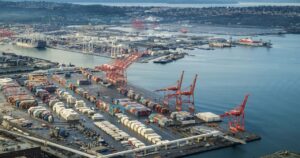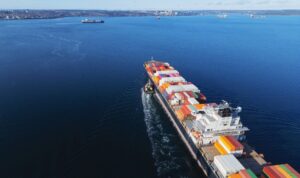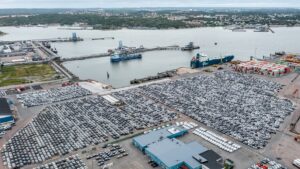The challenge of handling an increasing amount of cargo in a safe, efficient and environmentally-friendly way is one of the biggest questions facing logistics hubs and the wider maritime industry, but how can ports use artificial intelligence to improve operations?
Not only are more vessels calling at ports, but those vessels are also getting bigger, along with the amount of data being created and stored.
That data is a challenge in itself, as is finding the best ways to utilise it. Ports are more often than not looking to Artificial Intelligence (AI) as a way forward – but what is AI and how does it benefit ports?
What are key benefits for ports?
AI is transforming transportation at sea, on land and in the air. It has the potential to cut human error, make operations faster and cut emissions. However, AI itself is one part of a broader process to digitise and improve port operations.
AI as a concept began in the financial and services sector as a way of improving sales, trading and, latterly, customer service techniques.
Some of the world’s biggest ports, notably Singapore, Rotterdam and Hamburg, are using the same AI tools to improve business operations.
One way this improves operations is by building a decision-making support system based on a predictive model of behaviour.
It uses deep learning techniques to analyse data in a far more efficient way than a human ever could.
As well as historical data, this could also include image and voice recognition.
This part of the above mentioned process is called Machine Learning (ML), which you could call the ‘engine’ of AI.
Relevant stories
Data shortcomings and fear of change key challenges in AI adoption
Camco adopts AI vision-based recognition in new terminal safety solution
SDP 2021: Suez Canal crisis emphasises importance of AI and data science in ports
AI gateway investment a key for automation growth
AI in Focus: Can AI transform the way ports work?
Predicting the future
The data is collected, organised and processed; after that, AI is used to spot patterns in the logistics chain and offer detailed prediction times of when vessels, lorries and containers will reach terminals, therefore allowing for greater planning.
For example, an AI platform can predict that a container leaving a port six weeks from now is 65% more likely to go missing than normal. An alternative route can be found and recommended within minutes.
It can also be used to predict future equipment needs, long term yard utilisation, container damage, number of gate visits and more.
Efficiency and safety are just two major benefits of AI in ports and terminals, the other, perhaps greater one, is that it can bring supply chain stakeholders together.
An AI-enabled port ecosystem, powered by Port Community Systems, could increase collaboration between different parties, such as port authorities, cargo owners, third-party logistics providers, etc, as it will align their individual digital roadmaps.
This in turn could allow for mutually beneficial opportunities to improve efficiency and cut waste because Port Community Systems let parties share data and provide a standard interface for AI-enabled insights, predictions and constraints.
It is clear that AI has great potential for use in ports and terminals, but there are questions as to how it can be utilised.
Central to this is what data aspects, such as image recognition or robotics, will be most relevant to terminals in the future.
As the industry has seen with automation, there isn’t a process or approach which suits every port or terminal’s needs. Therefore, when applying AI tools to operations, ports and terminals should be hyper-aware of exactly what they needs and where best the technology can be utilised.








